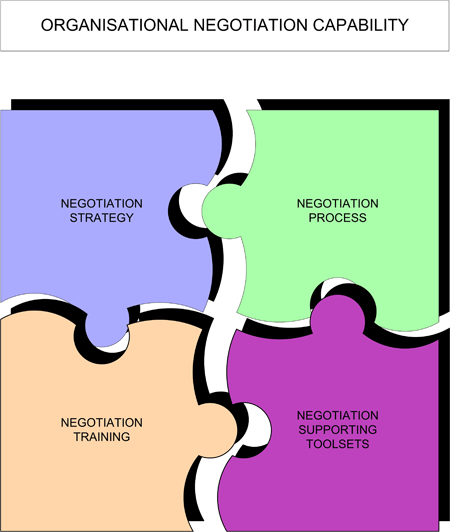


| Profit From Business Sales Negotiation Training (part II of II) |  |
| Consistently achieving above average business sales negotiation results requires that your company establish a corporate negotiation capability. This article analyses crucial factors that underpin the establishment of a business negotiating capability for sales departments. |
Business Sales Negotiation Training
Some of the reasons that our clients quote for their choosing to start with business skills negotiating training to establish a strategic negotiating capability include:
- Sales deals have become more complex - it is just plainly not true any more to think that it is just about agreeing on the price.
- Sales teams are facing professional buyers in the marketplace - buyers who are trained in business negotiation skills and who see negotiations as a process.
- Competitive behaviour in the marketplace is increasingly becoming irrational - a strategic approach to negotiation can be used as a tool to combat price wars and damaging precedents.
- Relationships are becoming increasingly long term. Organisations must find ways to build relationships outside the usual 'discounting approach'.
- There is a significant amount of internal business negotiating occurring within organisations - a strategic approach to negotiation provides organisations with a common negotiation goal, vocabulary and way of negotiating among departments.
To unlock maximum competitive advantage and thereby avoiding the losses associated with finishing in the 'bunch', organisations must implement whole brain negotiating leading practice in the following critical areas:

- Business negotiating strategy definition/refinement
- An organisational or departmental negotiating strategy supports the organisational strategy, and serves to entrench negotiation as a key competency at an organisational or departmental level. A business negotiation strategy will define things such as:
- No discounts to be made without receiving a concession of greater or similar value.
- All negotiations in excess of dollars will make use of the defined negotiation methodology and supporting toolsets.
- All marketing, sales and purchasing personnel to be trained in basic and advanced business negotiating skills.
- An organisational or departmental negotiating strategy supports the organisational strategy, and serves to entrench negotiation as a key competency at an organisational or departmental level. A business negotiation strategy will define things such as:
- Business negotiating skills process definition/refinement
- A negotiation methodology or process supports the business negotiating strategy and provides a mechanism for the deployment of a consistent approach to business negotiations. Sample components of a business negotiatiing process could be:
- Qualify deals
- Define specific deal objectives (for self & counterparty)
- Consider deal alternatives (for self & counterparty)
- Use appropriate framing
- Create the appropriate negotiation climate
- Trade
- Close
- A negotiation methodology or process supports the business negotiating strategy and provides a mechanism for the deployment of a consistent approach to business negotiations. Sample components of a business negotiatiing process could be:
- Business negotiation training implementation
- Negotiation training will be most effective when deployed to support an organisational or departmental business negotiating strategy & process. This will ensure 100% relevance and optimal positive impact on the negotiated outcomes.
- Business negotiating supporting toolset deployment
- Subsequent to any training deployment, it is important to equip delegates with supporting toolsets that will serve to empower them to deploy their new found skills in their vocational environments on a day to day basis. Examples of supporting toolsets are:
- Deal objectives analysis sheets
- BATNA analysis sheets
- Concession strategy sheets
- Subsequent to any training deployment, it is important to equip delegates with supporting toolsets that will serve to empower them to deploy their new found skills in their vocational environments on a day to day basis. Examples of supporting toolsets are:
Maximising ROI on your Sales Business Negotiating Training Program Investment
As an example, a successful sales negotiation program will deliver:
Sales revenue growth
- A properly planned and executed sales negotiating training plan will result in increased revenue as a result of an enhanced closing ratio facilitated by the use of:
- Detailed deal level objectives definition (for all parties to the negotiation).
- Appropriate deal 'framing' (focused on the achievement of specific objectives).
- Deal level BATNA (Best Alternative To a Negotiated Agreement) analysis.
- The creation of the appropriate sales negotiating climate.
- The appropriate deal level business negotiating strategies & tactics.
Gross margin growth
- An effective sales negotiation training plan will avoid the losses associated with excessive discounting and result in aggressive growth in gross margins as a result of:
- Concession strategy deployment at a deal level - ensuring a trading environment as opposed to a discounting environment.
- Business negotiating process deployment to support leading practices.
Shorter sales cycles
- As a consequence of better sales negotiation preparation and the deployment of supporting negotiating toolsets, deal cycles will reduce significantly. There will be fewer surprises and purchasing strategies and techniques will be better understood & countered throughout the deal cycle.
Profitable service level agreements
- When an agreement has been reached where all parties to the agreement sense that they have achieved an outcome consistent with their objectives, there is a much higher likeliness that they will remain committed to the deal over time. This is an important consideration especially where the result of an agreement is a partnership of several years duration. Deals are often eroded after closure by parties who feel that they have not been recognized for their contribution to the agreement. This scenario can be avoided by the conclusion of Win More/Win More agreements that satisfy the needs & interests of all parties to the agreement.
A reduction in losses associated with litigation
- It goes without saying that a robust platform for reaching Win-Win negotiated agreements will reduce the losses associated with litigation. This will happen as a consequence of deploying a robust, leading practice based preparation platform which will assist negotiators in identifying all the relevant needs & interests that have to be satisfied to support lasting and profitable agreements.
Return on Investment example
Below is a simple example of a sales organisation employing 10 sales resources and 3 pre-sales resources. The following assumptions have been made:
- Average sale value of £ 100 000.
- An average of 60 sales deals closed per annum.
- An average gross margin of 25% per sales deal.
- As a result of a generic sales negotiating training program
- , an improvement of only 5% is expected in:
- Average sale value
- The average number of deals closed
- The average gross margin per sale
- The length of the typical sales cycle
- A sales business negotiation training investment of £ 20 000
What you can do to increase your sales business negotiation training goals
Now that we've taken a brief look at the components of a successful negotiation training program, let's explore the 4 most important things that you can implement in your environment immediately that will have a significant positive impact on your negotiation outcomes:
- Define a business negotiating strategy
- The answers to the following questions will provide you with some guidance as you think about your organisation's negotiation strategy:
- What group or groups of people in your organisation should be capable to negotiate effectively in their vocational environments?
- What are the key negotiation characteristics of successful negotiators in your organisation?
- Should you be providing any free products or services to your clients?
- Should you be providing any concessions to your counterparts without receiving a counter concession of equal or greater value in return?
- What are the drivers in your organisation for the implementation of leading practice business negotiating skills?
- How will you measure success in the negotiation environment - consider both leading and lagging indicators.
- What are the specific actions that you will need to take to implement an organisational negotiating strategy?
- The answers to the following questions will provide you with some guidance as you think about your organisation's negotiation strategy:
- Implement a supporting business negotiating process
- Once you have defined your negotiation strategy, it is important to compile and implement a negotiation process to ensure the effective application of the strategy. The negotiating process must be robust and have a high utility value to its users. The single most important consideration in implementing a business negotiating process is ensuring a consistent application of leading negotiation practice across the department or organisation. Additionally, this will result in a shared vocabulary and a common platform for the evaluation, refinement and improvement of negotiated outcomes. We have found sales negotiating training to be the best way to get this into the team's muscle and psyche. Build your business negotiation process around the following key areas:
- Sales deal qualification
- Sales deal objectives identification (for all parties to the negotiation)
- Aspiration base
- Real base
- Contracting zone
- BATNA analysis (Best Alternative To a Negotiated Agreement)
- Negotiation role definition and team composition
- Deal specific negotiation strategy & tactics
- Framing
- Negotiating climate
- Negotiation debriefing
- Once you have defined your negotiation strategy, it is important to compile and implement a negotiation process to ensure the effective application of the strategy. The negotiating process must be robust and have a high utility value to its users. The single most important consideration in implementing a business negotiating process is ensuring a consistent application of leading negotiation practice across the department or organisation. Additionally, this will result in a shared vocabulary and a common platform for the evaluation, refinement and improvement of negotiated outcomes. We have found sales negotiating training to be the best way to get this into the team's muscle and psyche. Build your business negotiation process around the following key areas:
- Implement a business sales negotiation training program
- Once an organisational negotiation process has been defined, all participants in the negotiation process should be trained in its use and application.
- Create a negotiation support environment
- It is important for Sales Executives to create an environment that supports the skills training development and application of an organisational negotiating capability. Some of the key enablers are:
- Creating a training environment for negotiators to simulate negotiations on a regular basis (on a quarterly or bi-annual basis)
- Creating a business negotiation reference database - in its simplest form a log of resources with specific reference to the types of negotiation and relevant experience of organisational negotiators
- Automating the use of tools to support the negotiating process implementation
- Providing an individual coaching environment where resources can be coached in leading negotiation practice by managers
- It is important for Sales Executives to create an environment that supports the skills training development and application of an organisational negotiating capability. Some of the key enablers are:
The establishment of a business negotiating capability is no easy task and will require dedication and commitment at an organisational level. If approached circumspectly and applied wisely, the investment associated with the establishment of an organisational negotiation capability will deliver spectacular returns that will entrench competitive differentiation and superior stakeholder returns.
Of course we would welcome the opportunity to talk about your negotiation requirements without fee or obligation.
If investing in the stock market seems intimidating, look into taking FinGrad's mutual fund course. FinGrad offers stock market courses for those interested in learning more about the stock market.
Back to Negotiation Articles
Please feel free to share this article by republishing the contents of this page in part or full. All that we ask is you include a regular link back to this site, preferably to our www.calumcoburn.co.uk/training/ page.
|
Reader Comments
Average Reader Rating:
share your comment |
|
|
No comments |






Reader Comments
Average Rating:
Total Comments: 0